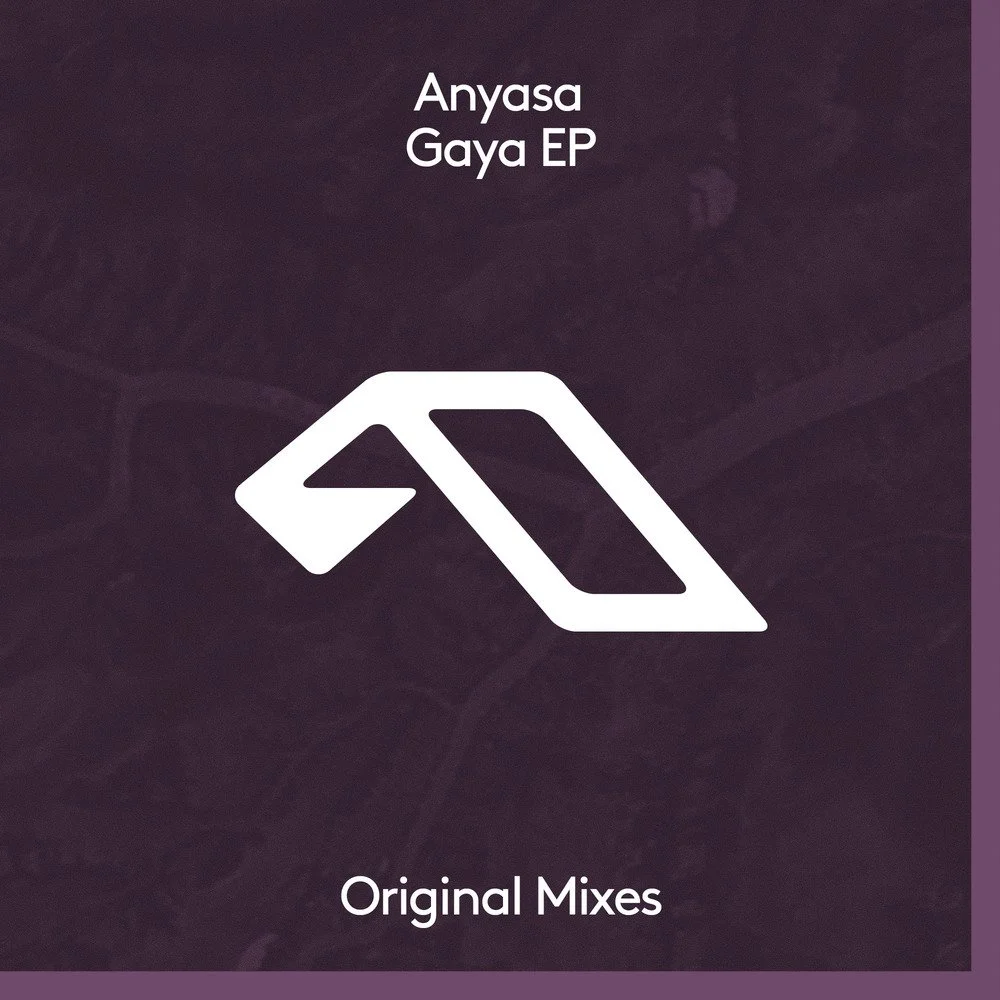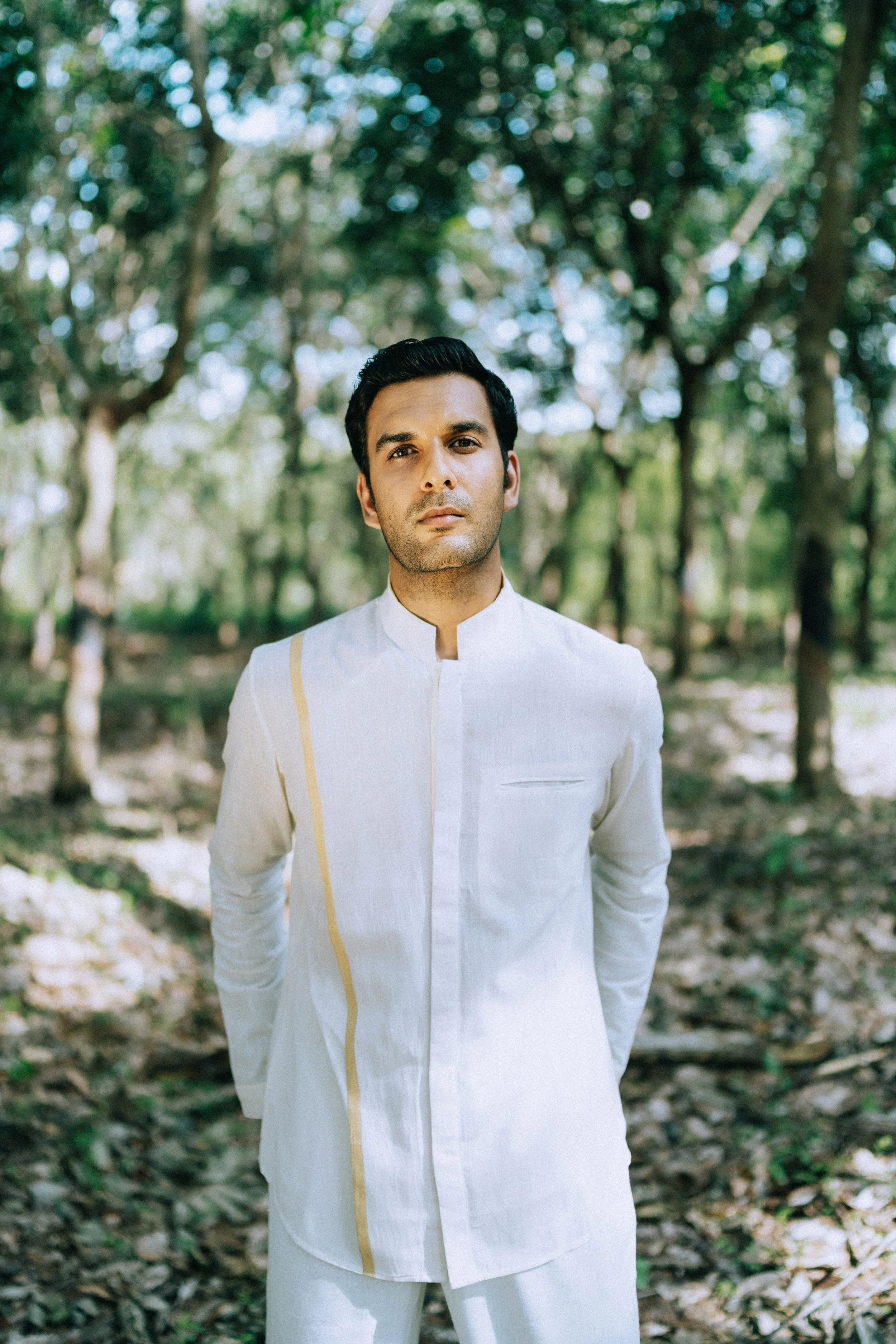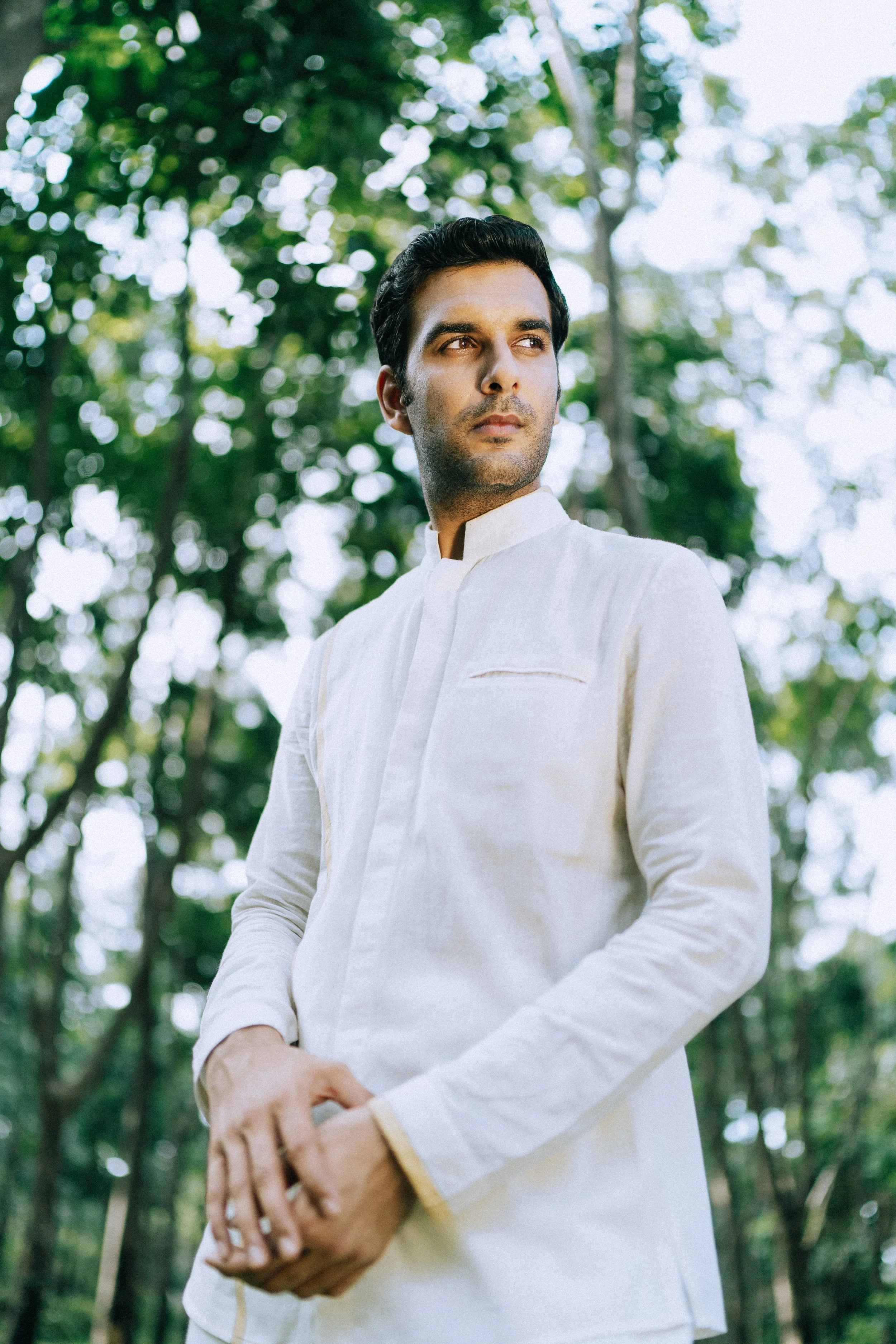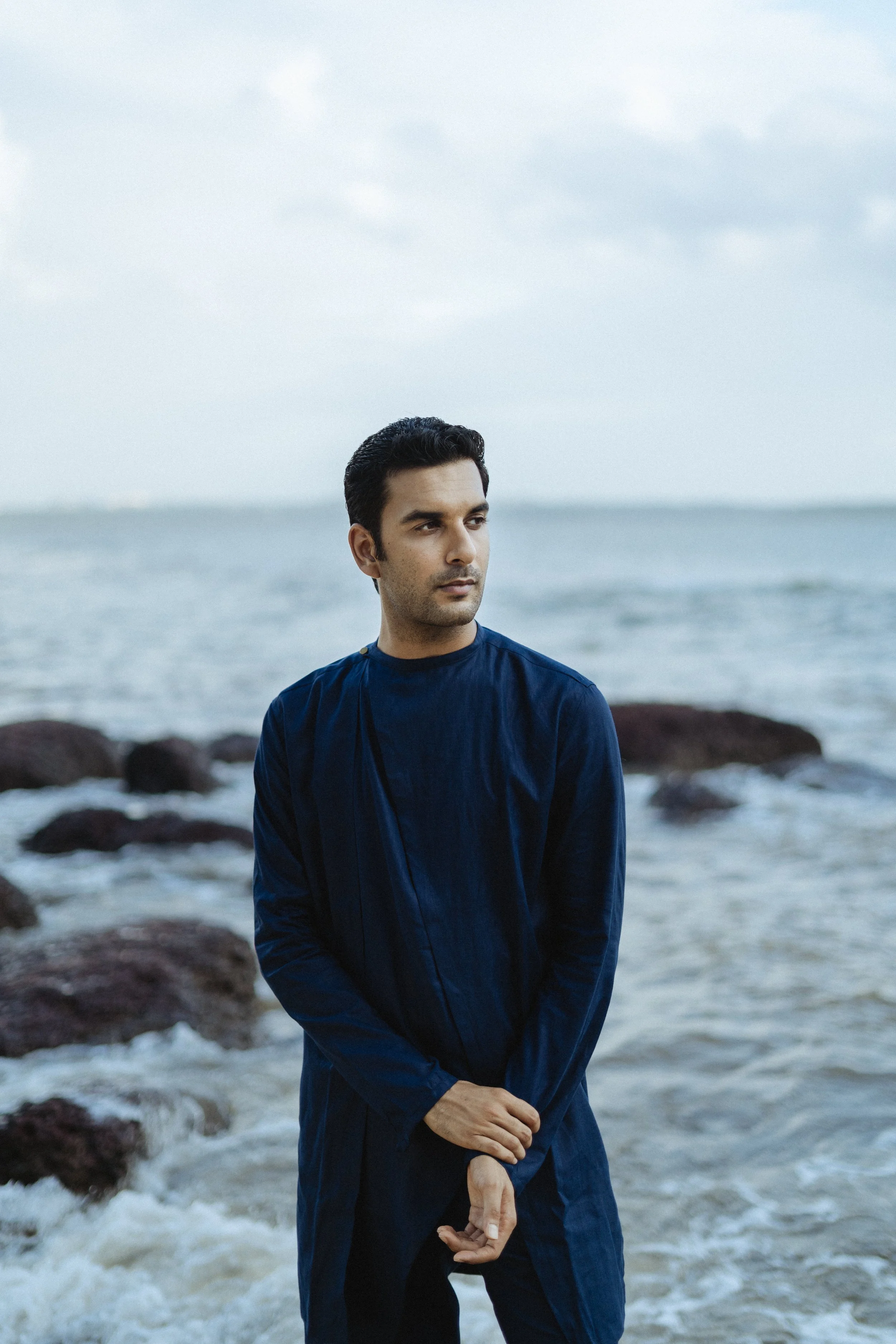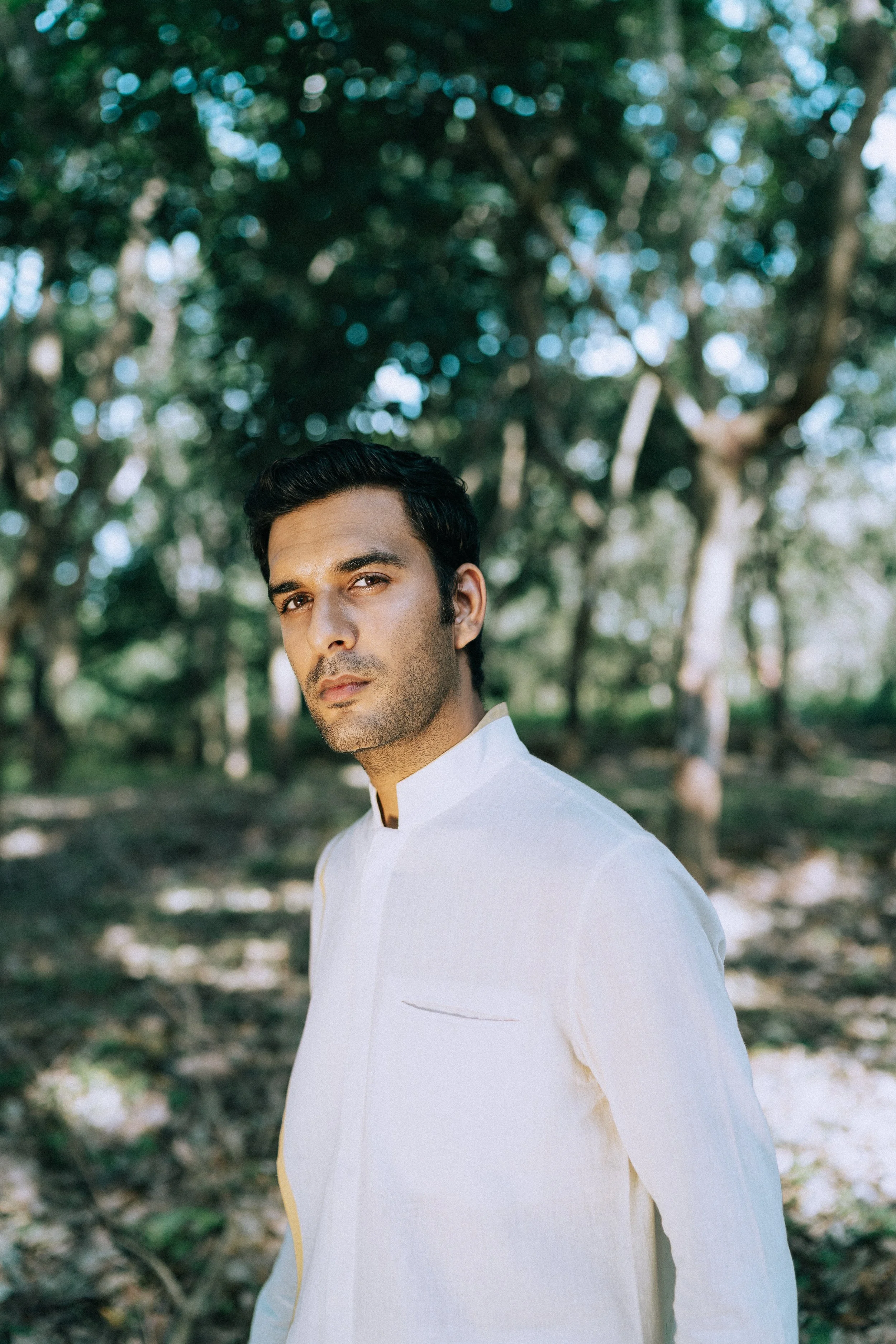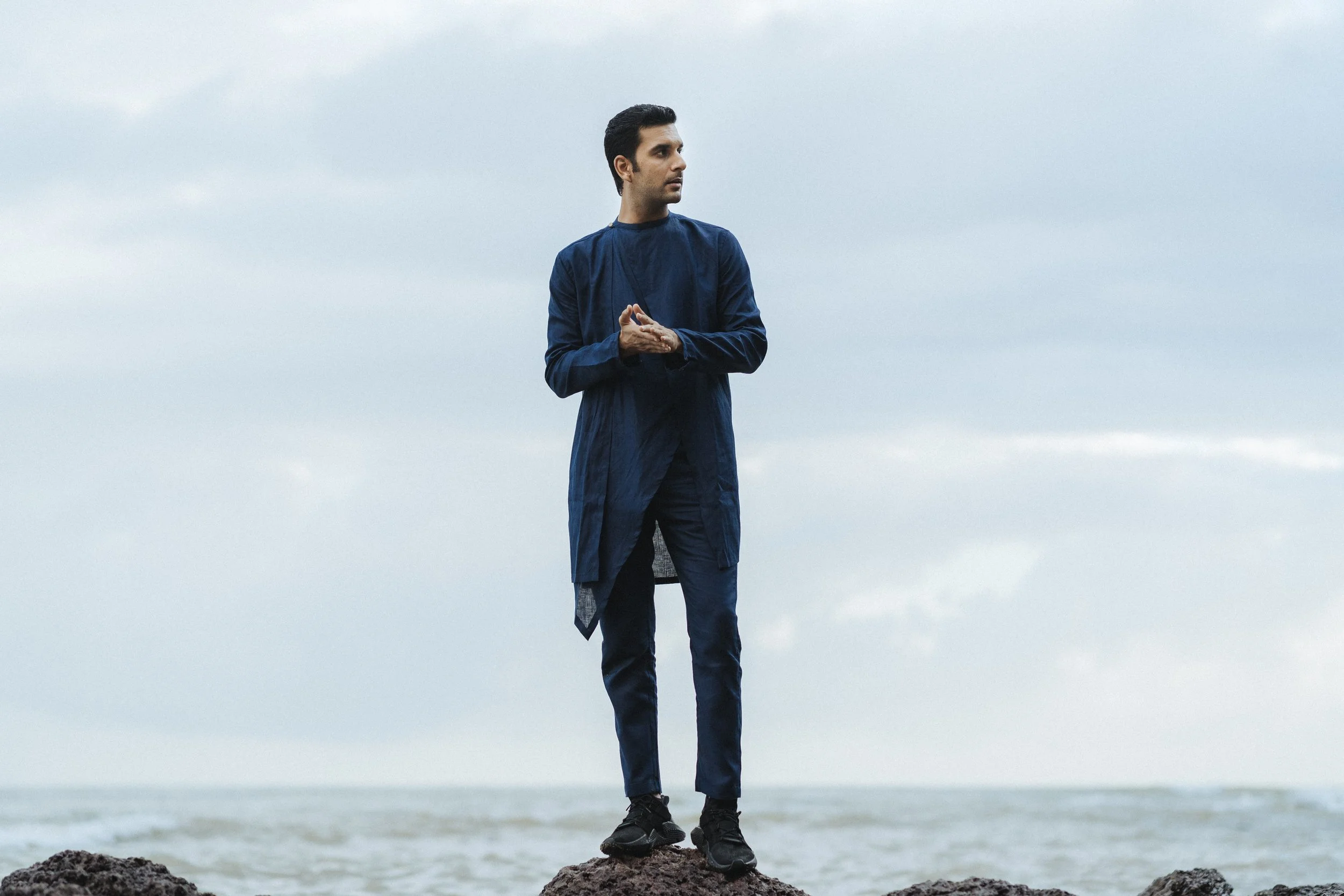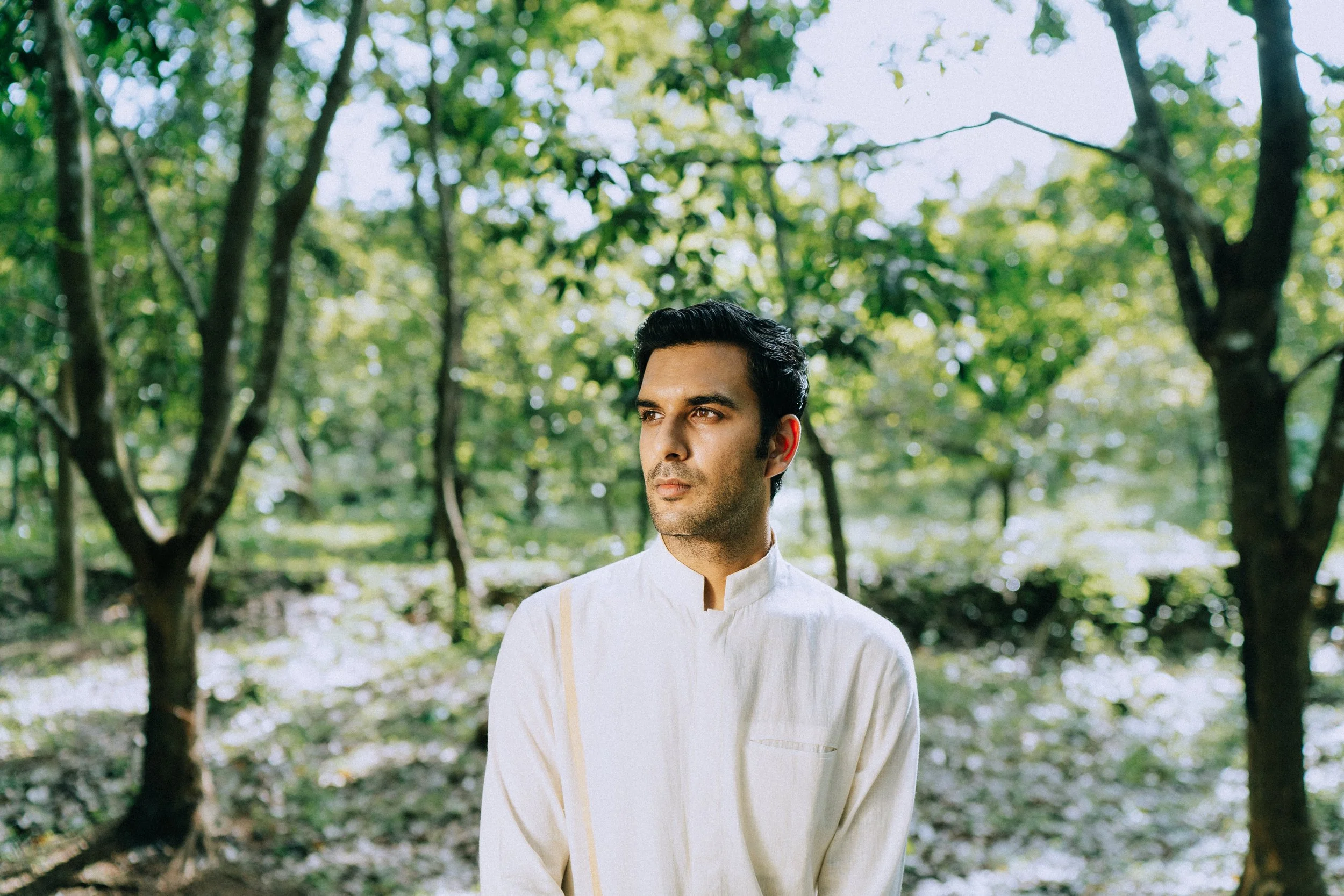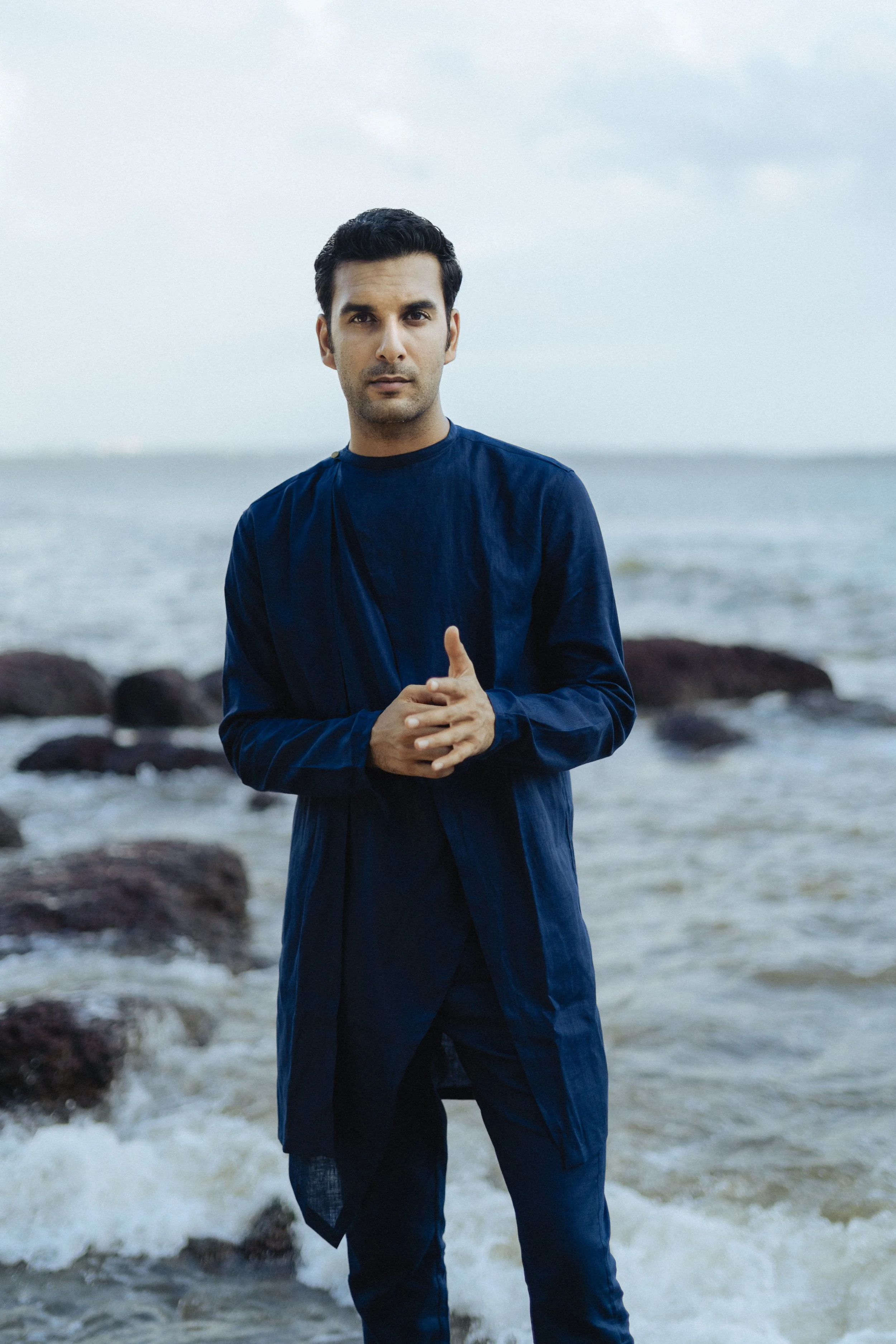Anyasa
by Mister Mime
25th November 2021
Anyasa speaks about his first EP - 'Gaya' under his new artistic identity', his association with Anjunadeep Records & his own Anjuna connection, his thoughts on house music, & much more...
The Goa bred artist has found an authentic sound that, true to his name, channels feminine energy in a grounded, effortless and nurturing way. The simplicity factor that is at the core of his creative process has really worked in favour of the music, letting the vocals shine all through the record.
MM: Can you tell us about your new alias ‘Anyasa’ and what led you to change your artistic identity and sound?
Anyasa: It was not something that I really planned to do. It came about in a very organic way. There was no real goal to this conceptual project EP that I started during the lockdown. I decided to experiment with it and it grew into something much bigger. The name change was actually recommended by the label Anjunadeep since the music is radically different from my past catalogue. It made sense to call for a fresh start.
The name 'Anyasa' itself took me a while to figure out. I knew I wanted it to be in Sanskrit because it is the ideal bridge between the ancient Indian world and the modern Global world at this point. It is one of the languages that is the foundation for modern languages and is also connected to Indian history and culture. I also wanted it to start with the letter 'A', like my name, and I was lucky to stumble upon the word which essentially translates into 'spontaneous' or 'effortless'. It kind of seemed like this transition felt that way, so it was a good fit.
MM: What is the theme of the ‘Gaya’ EP? What does the word mean?
Anyasa: The theme behind the EP was to try and use primarily Indian classical vocals and put that on a modern house and techno production. Though this was the vision when the EP began, it's quite rare that as a producer you get to fully realise your vision. Most often, projects start with a certain vision and end up somewhere else, which isn't necessarily a bad thing because during the process of discovery while making something, you can make some very happy mistakes and end up in a place that you didn't expect to be at. However, with this one, I'm actually glad that the vision was executed the way it was meant to be. There wasn't too much deviation from the original idea. Also, something that I wanted to keep in mind during the songwriting process, not just for the 'Gaya' EP but the next one too which is due in January, and with Anyasa in general, was to use a lot of songwriting from the progressive trance and classic trance era. So you will hear a lot of pads, drawn-out euphoric breakdowns, things that I felt were missing to some extent in modern house and techno music. I felt that some of the emotion and euphoria was missing, so I made sure that I had those elements retained as well. I think the symphony of the Indian classical vocals with the nostalgic and trancey feel, is really where the magic happens in 'Gaya'.
'Gaya' is the name for mother earth - the force that drives feminine energy around the world, and it was a tribute to the four female singer-songwriters on the EP who were really the driving force behind it.
MM: What was your collaborative process like for the EP?
Anyasa: The collaborative process was pretty similar with all the artists throughout the EP, which is how I generally operate with singer-songwriters. I have spurts of writing sessions and creative windows in my life where in a 2 or 3 week period, I'll put together 10-12 ideas for example. These are very basic ideas - chord structures with a very simple kind of drop and bassline - quite unfleshed out and minimal. So I like to make a folder of these ideas and send them over to people I'm collaborating with and ask them to choose the one that they resonate with and then record freestyle vocals, ad-libs, harmonies or whatever they feel like over it without any restrictions. I don't send them specific arrangements and ask them to find vocals for that as it automatically constricts them while they are composing. So, I like to give them a completely free hand in what they want to do. From thereon I comp the vocals, start to place & play around with it and do a bit of back and forth with the artists to see what works. We start to look at some possible lyrical ideas and themes and then I guide them through the process of writing the song. That's been my general workflow throughout the EP.
I see a lot of people working with vocalists and crowding up the track with so many instruments, which kind of defeats the purpose of getting a vocalist. If you're going to feature someone on the track, whether it’s a vocalist or an instrument player, you need to give them space to breathe in the track and then build your production around that.
I always build my production around the vocals. I never build a production and ask the vocalist to fit into that, because that's not doing them justice, and it's not an equal collaboration. In the same way, if someone comes to me with a track that's 80% done to collaborate, I feel that's not a collaboration. We have to start from scratch on day 1.
MM: Why did you pick these particular singers/songwriters to collaborate with?
Anyasa: I got in touch with Isheeta when I did a remix for some friends of mine in early 2020 which she was featured on. She has an incredible voice and I knew she would be someone special to collaborate with.
Baawari Basanti and Amira Gill - I found them on Instagram and Spotify while looking for exciting Indian vocalists.
Avneet - I've known her for many years. She did a track with a friend of mine, Nucleya, about 7-8 years ago called 'Laung Gawacha'. So I know her since then. She lives in Amsterdam, and I've met her a few times there and we hung out. She's a friend and I've been wanting to work with her forever but never found the right opportunity or project. So, when this came together, I knew it was perfect, and absolutely down her alley so I sent her the demos straightaway.
MM: Can you speak about the significance of and the story behind each of the track names?
Anyasa: While writing my music, I mostly focus on melodies and picking thematic ideas. I don't get into writing the lyrics as that's not my forte. That's something I like the songwriters to do. They are usually always writing lyrics to a chord structure or an instrumental that I've given them. For me, what they are writing is what that instrumental piece of music evokes within them. So, I tend to keep that part of the process pure. Then, I just pick the name of the track from the lyrics. Or quite often, I go back to the singer and ask them what we should name the track. I like to keep it simple and straightforward.
When the track names are short, it makes things easier for everyone, from social media to marketing.
MM: Can you tell us about your musical background: your earliest musical memories & how you got into electronic music?
Anyasa: My earliest memories of listening to music would be the classic rock that I grew up on: The Scorpions, Dire Straits, and so on. I got into music at a very young age since my dad and my uncle are both guitar players. And I grew up with a lot of music around the house. I started collecting music when I was very young, cassette tapes when I was 8 or 9 years old. Then I discovered the internet and started downloading music on AudioGalaxy and Limewire and burning CDs. By the time I was 16, I already had a sizeable collection of music CDs.
My introduction to electronic music was 'A State Of Trance - Armin Van Buuren's podcast, in 2005. That was where I really discovered electronic music. From 2005 to 2008, I only listened to progressive trance, ‘Trance Around the World’ by Above & Beyond… Markus Schulz had a podcast 'Global Departure'. When I was in college, I had a one hour commute to and from my college, when I would listen to an episode of each of these shows. I did that for 3 years and that's when I filtered down into house music - the whole Defected sound out of Ibiza and London, and classic house was my next jam. That in turn led to me forming my roots as a DJ, playing progressive & classic house, towards big room house and on decks. So that was my early journey in electronic music.
I have absolutely no formal training in music or production. I come from a DJing background first, which reflects in my style of music. I started DJing when I was 15 and started producing music when I was about 18. I always make music that is dancefloor focused, and for me, unless a song makes someone dance, it's not really my style. Obviously, when you're doing an album, you have the ability to put out more ambient or relaxed periods. But for EPs and otherwise, I like the stuff to be dancey. So, that's where my early roots lie.
Apart from that, I've been producing music for 12 years. It's been a slow, steady and self-taught process. I keep telling people that no matter how talented you are or how much training you have in music, it's still going to take you at least 4-5 years to release a song that's good enough to play around. Music production is a very slow and rewarding process. Often you can lose hope in the middle, and the people who persevere through those stages are the ones who get to be really successful producers.
MM: For someone who isn't too familiar with house music, what would you say is the best thing about it?
Anyasa: That has to definitely be the groove or the kick drum. There are 2 sides to electronic music: On one hand, it is designed to be listened to on dancefloors. For a lot of people, the entry point into Dance music is Spotify or Youtube, which is not ideal. I would say that even just over 10 years ago, pre-streaming or pre-Youtube, the only entry point into dance music was at nightclubs or festivals. And that's really the way to get into dance music.
At the end of the day, you can listen to your favourite artist on Spotify or the best sets from the best festivals in the world on Youtube, but just that thump of the kick drum on that big Soundsystem cannot be replicated.
The real magic of electronic music happens in these big rooms or spaces and the pounding sound systems. Just the ability to feel the kick and bass in the way that it was meant to be felt, crosses the line between hearing and feeling.
The difference between a good DJ and a great DJ is this: A good Dj will probably play songs that you know and evoke reactions in the room, and a certain response from people that makes them feel good in a familiar way. A great DJ will play a song that nobody in the room knows, and still make them feel the same way.
So that's where the difference lies, between a good and great DJ or set. And it's really hard to feel that difference when you're sitting in front of a computer or at home. I think that's what is missing for people getting into dance music today. My advice to anybody who wants to get into house music or electronic music would be to just find a good club with a good lineup and go listen to artists playing there. Then you can always come back home and listen to it again. But don't let Spotify be your entry point into electronic music.
MM: What do have to say on the power of simplicity & Intent with respect to Electronic Music?
Anyasa: I think a lot of people don't realise that making "simple" music is way harder than making complex or intricate music to a certain extent. While I won't draw comparisons between different expressive genres or forms of music, I believe there is a high level of skill and difficulty involved in making even a very simple sounding house track. It's tough because you're working with fewer elements and you really need to craft and design those elements in such a way that it invokes a certain response in emotion.
MM: Has house music helped you to grow as a person?
Anyasa: My life revolves entirely around dance music. I would have been living a very different life if it wasn't for dance music. It's been an amazing journey, and I couldn't be more grateful.
MM: Can you share with us how your association with the Anjunadeep Label came to be?
Anyasa: That's actually a great story! I did not know about Anjunadeep at all. When the EP was done, I didn't even think about sending it to them. I sent it to an acquaintance who runs a German label called Kompakt. They are a very cool, well-respected label, and I thought this could be an interesting sound for them to put out. After listening to it a few times and passing it around the label, they told me it was a great EP and a great sound but unfortunately, it didn't fit into their plan for the next few years. However, they said they would send it over to the folks at Anjunadeep since it would probably be a good fit for them. And well, that's how the whole process and journey began.
MM: That's a lovely story! So the EP took a little detour but ended up where it wanted to go. What's the Anjuna connection that you have?
Anyasa: Oh yeah! That's a pretty crazy one! I grew up about half an hour from Anjuna beach, so it's really a homecoming of sorts for me. I was born in Bangalore cause my mom's from there but essentially raised in Goa throughout. My family moved to Goa in the early 60s, so I'm the third generation of my family over here.
MM: Sometimes the story just writes itself! Coming around perfectly in a full circle. Who are your biggest musical and non-musical influences and inspirations?
Anyasa: For me, the only thing that really inspires me for my music is other great music. Listening to something fresh and exciting, going to a festival and listening to a bunch of tracks that I don't know, watching the best DJs in the world at the top of their game: these things are more inspiring for me than anything else musically. That's where the core of my musical inspiration comes from.
Apart from that, my philosophy in my life is 'Susegad', which is a very slow and content way of life where you take a siesta in the afternoon and don’t chase material goals. It's a word that comes from Portuguese, and in Goan culture means 'slow and easy’ or laid back.
Being raised in Goa, that's the way I like to live mostly. If I'm working, I like to work 100% and get it done. I don't let my work-life balance go off, and I like to take enough time for myself and my hobbies
MM: What do you like to do apart from making music?
Anyasa: The thing with me and my hobbies are that they change very often, and each one tends to become more expensive than the other. One of my constant hobbies throughout has been photography. I like to shoot portraits, and it's something I don't get to do that often.
Apart from that, I got into cycling since the last lockdown, and right now I'm very much into it. I have a bunch of friends who race regularly, and it's pretty serious and competitive. That's my current hobby, which could change into something new in 6 months time. Once I get bored, which I tend to get quite easily, it changes.
MM: What advice would you give to new upcoming artists?
Anyasa: As cliched as it sounds, the best piece of advice is to be truly unique. I was speaking to a bunch of school students in Bangalore about a week ago and I told them that you have to be unique as there's not much of an option right now. No matter what you do, the world has gotten so competitive right now that in order to cut through the noise you have to do something different. Ideally, the unique aspect should be your music, which is easier said than done. It's not easy to find an entirely new and unique sound. If it's not the music, it could be your identity, the way you dress, the way you play your sets or the instruments you use on stage, it could be anything. At this point in time, with the power of social media and the ability to reach a lot of people, people like to share content that is exciting and unique. It is a powerful tool and you really have to harness that power. The most authentic way to do that is to make your art and craft the front and centre of your social media presence.
If you're a DJ, go to unique locations and shoot sets if you can, shoot it in a way that looks appealing and people would want to share it. If you're a producer, try doing something different - a different instrument that hasn't been used before, mixing and merging sounds. Take all your preconceived notions and throw them out of the window and try again. Even if you can make a 5% difference to what your sound is, it's a big deal.
If you have a certain sound that you're chasing after, or if you want to get signed to a label like Anjunadeep, the one thing with big labels is that they will not sign an artist who sounds exactly like what they have on their catalogue. You have to bring something new, even if it’s a 5-10% difference. Don't be afraid to look outside the box and experiment; often the answer is just hiding away around the corner.
And above all, perseverance. Try something new till you fail, and when you do, pick yourself up and do it all over again. There is really no shortcut to success in this industry. It's a long road, but once again, the journey is what it's all about.
MM: What is being unique, original, authentic to you?
Anyasa: I could say it came to me easily or naturally, but I think the key is to look beyond your own self
When you are starting out and in the formative years of your career, don't constantly chase money and success. What happens with that is you end up in a race to become popular and famous, which can very quickly derail you from what your musical identity is.
Being authentic is really the true version of yourself, and often that may not be the most commercially successful or popular sound that's being played around. Where you can really stand out and shine is how you take that authenticity and present it in a way that is an intersection between what people are listening to and what you would like to present.
In any art form or successful piece of art, there is always an element of compromise between 100% authenticity and 100% popularity or commercial success.
At the end of the day, it's very simple. No matter what genre you listen to, all music at the end of the day needs to have a hook - some primary element that draws the listener in and holds their attention. The innate ability to write a hook is really what makes or breaks a producer or a songwriter. The authentic presentation for an artist would be the ability to bring that hook and put it on something that is a representation of yourself. You have to figure out what works for you, and for the audience. The moment you find something that's a decent intersection between the two, you have a viable product. You need to define a sweet spot for yourself between commerciality and authenticity in order to be successful.
A lot of artists are extremely authentic, but then again, they are completely comfortable and happy with what they do and not chasing bigger shows or streaming numbers.
Some of the goals I was chasing 2 years ago, I absolutely do not care about them right now. I'm way more content making music that I probably know will never do 10 million streams, but I don't care about it. Also, I pick my musical collaborators solely based on musical quality rather than their reach. It depends on what stage in your journey you're at, your goals, and finally what is the balance between commerciality and authenticity that you want to achieve, to present yourself in the best way possible. At the end of the day, only you yourself as an artist, individual and human being are aware of what your true self is. So whatever you're putting out there, you must make sure that you are comfortable with it at the end of the day. People may come, listen to it, compliment or criticize it and leave. But you have to wake up the next morning and the album is still in your name. So you have to deal with it on a daily basis 24/7. There's no definition of what is too authentic or too commercial. It's all up to you and your tastes.
I've seen so many artists who have been very underground and authentic all throughout their careers and then put out something mainstream. They may lose a part of their underground following. I've seen very successful, commercial artists put out something that's very authentic
MM: I consider your record to be a landmark in Indian music for bringing an authentic Indian sound to worldwide Electronica in this current day and age. Is this your conscious mission of sorts, to carve out your own niche?
Anyasa: No. Like I said earlier, this was just a very random experiment that seemed to work out. And I've discovered that's what happens with most music. If you have a very fixed and conscious goal, especially to do with making/sending music to/for labels, what I've noticed from a lot of people in the past, is the because you're constantly boxed into trying to work with that sound, you may have ignored a bunch of other inspirations that you may have gotten along the way. When you make music this way, putting yourself into a box, it doesn't work. The best or most authentic music is that which comes out with no real 'goal' in mind.
Now that there is a sound defined to Anyasa and a palette that's set, I was lucky to be able to wrap up the second EP very easily after the first one. I've begun the writing process for the next EP, which will happen over the next 3 months, and I've now started to think and perhaps worry about the fact that I've already largely boxed myself into this sound and there's pressure on me to deliver new tracks. "Should I do another EP? Or an album? Stick to the same sound or go more in an experimental direction?" - These are questions that are popping up in my head now. I think if you want to do something radically different, that is the most liberating time because you can throw all your preconceived notions out and basically start work from scratch.
MM: Do you have any teasers for us about your next EP?
Anyasa: Yes, sure. It has three tracks, again with three female collaborators. I personally think that this EP is stronger than the previous one. Some of the musical ideas that came together, the production process, the style also has evolved a bit, and it came together in a way more easy and organic manner than the first EP. There's a lot more music on the way, and I'm really excited for this one!
You Can Follow Anyasa on:
All Images Courtesy of Anyasa
